

The Four Qualities of Love. The teachings on love given by the Buddha are clear, scientific, and applicable… Love, compassion, joy, and equanimity are the very nature of an enlightened person.
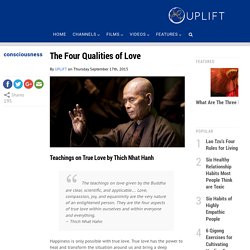
They are the four aspects of true love within ourselves and within everyone and everything. – Thich Nhat Hahn Happiness is only possible with true love. True love has the power to heal and transform the situation around us and bring a deep meaning to our lives. There are people who understand the nature of true love and how to generate and nurture it. The teachings on love given by the Buddha are clear, scientific, and applicable. During the lifetime of the Buddha, those of the Brahmanic faith prayed that after death they would go to Heaven to dwell eternally with Brahma, the universal God. A vihara is an abode or a dwelling place. Why We Fall in Love: The Paradoxical Psychology of Romance and Why Frustration Is Necessary for Satisfaction.
Adrienne Rich, in contemplating how love refines our truths, wrote: “An honorable human relationship — that is, one in which two people have the right to use the word ‘love’ — is a process, delicate, violent, often terrifying to both persons involved, a process of refining the truths they can tell each other.”
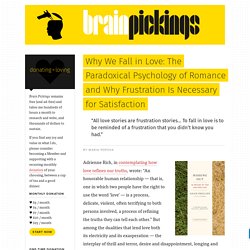
But among the dualities that lend love both its electricity and its exasperation — the interplay of thrill and terror, desire and disappointment, longing and anticipatory loss — is also the fact that our pathway to this mutually refining truth must pass through a necessary fiction: We fall in love not just with a person wholly external to us but with a fantasy of how that person can fill what is missing from our interior lives. Psychoanalyst Adam Phillips addresses this central paradox with uncommon clarity and elegance in Missing Out: In Praise of the Unlived Life (public library).
Phillips writes: John Steinbeck on Falling in Love: A 1958 Letter. Nobel laureate John Steinbeck (February 27, 1902–December 20, 1968) might be best-known as the author of East of Eden, The Grapes of Wrath, and Of Mice and Men, but he was also a prolific letter-writer.
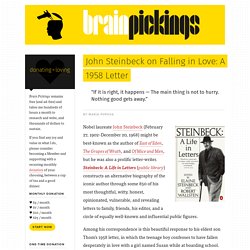
Steinbeck: A Life in Letters (public library) constructs an alternative biography of the iconic author through some 850 of his most thoughtful, witty, honest, opinionated, vulnerable, and revealing letters to family, friends, his editor, and a circle of equally well-known and influential public figures. Among his correspondence is this beautiful response to his eldest son Thom’s 1958 letter, in which the teenage boy confesses to have fallen desperately in love with a girl named Susan while at boarding school. The Greatest Definition of Love. Literary history is as strewn with colorful attempts to define love — including some particularly memorable ones — as modern psychology is with attempts to dissect its inner workings.
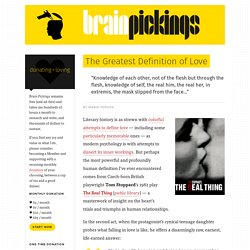
But perhaps the most powerful and profoundly human definition I’ve ever encountered comes from Czech-born British playwright Tom Stoppard’s 1982 play The Real Thing (public library) — a masterwork of insight on the heart’s trials and triumphs in human relationships. In the second act, when the protagonist’s cynical teenage daughter probes what falling in love is like, he offers a disarmingly raw, earnest, life-earned answer: It’s to do with knowing and being known.
I remember how it stopped seeming odd that in biblical Greek, knowing was used for making love. Whosit knew so-and-so. Albert Camus on Happiness and Love, Illustrated by Wendy MacNaughton. Weaknesses. Highly Sensitive Person. Senescence. How To Know It’s Love. If you try to Google “how to know you’re in love,” you’re gonna have a bad time Because it’s mostly shit advice.

Here’s a small sampling: “They’re always on your mind” This is infatuation. If someone’s “always” on your mind, you’re not focused on other Really Important Things. Real love fits into real life, rather than usurping it. “You crave them” or “can’t get enough of them” See above. “They’re your ‘everything’” Ditto. “You see them in your future” “When I imagined my future job/location/adopted dog, they were always in the background of my imagination helping me out with whatever I was doing. Well, I mean, damn. The problem is that we’ve made “love” into a game of escapism, and measure potential partners by how they fit into that fantasy. So, sure, see them in your future — but not because they “complete the picture.” “They’re the person of your dreams” “You always want them around” Ha. You should usually want to see bae. Don’t think it’s not love just because sometimes you want space. Well. How to Love: Legendary Zen Buddhist Teacher Thich Nhat Hanh on Mastering the Art of “Interbeing”
By Maria Popova “To love without knowing how to love wounds the person we love.”
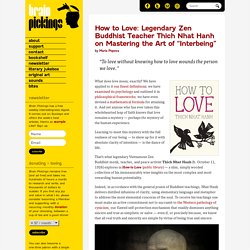
What does love mean, exactly? We have applied to it our finest definitions; we have examined its psychology and outlined it in philosophical frameworks; we have even devised a mathematical formula for attaining it. And yet anyone who has ever taken this wholehearted leap of faith knows that love remains a mystery — perhaps the mystery of the human experience. Learning to meet this mystery with the full realness of our being — to show up for it with absolute clarity of intention — is the dance of life.